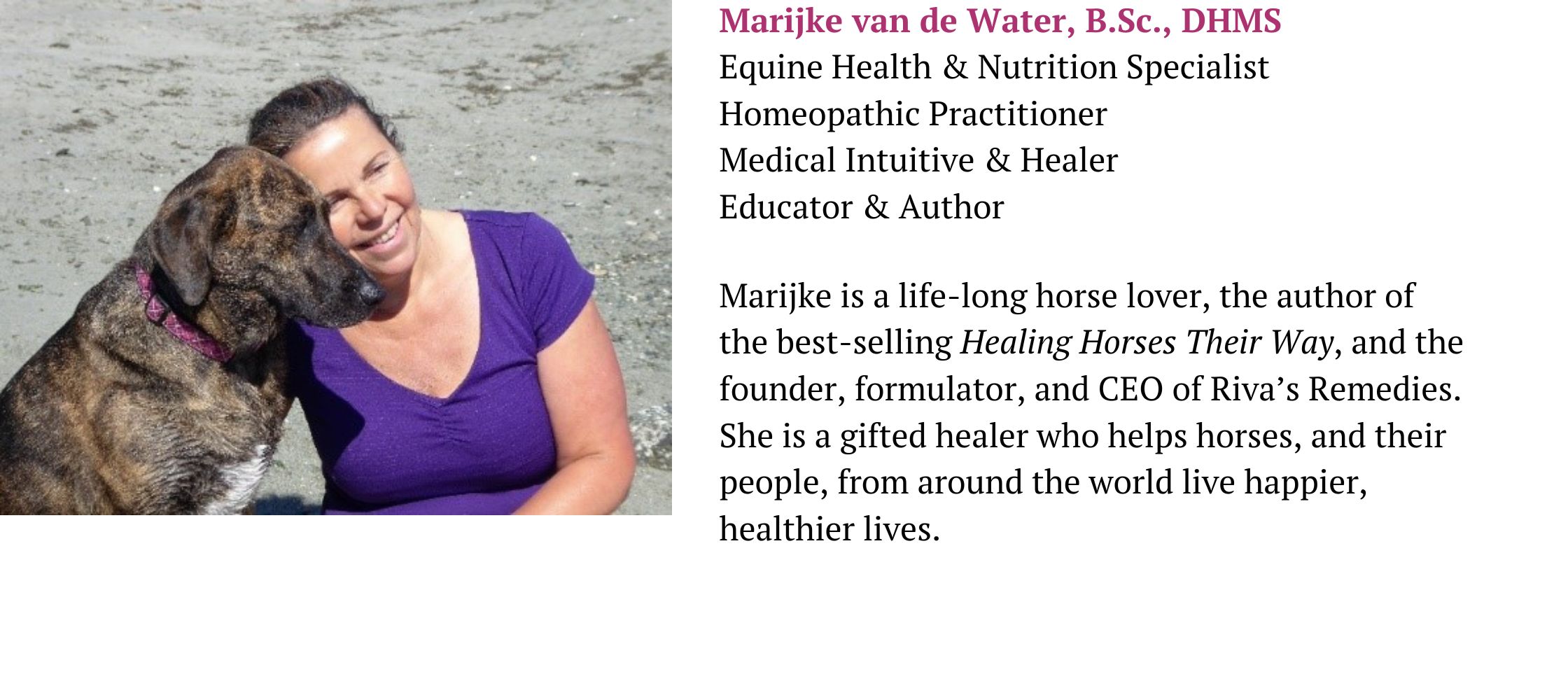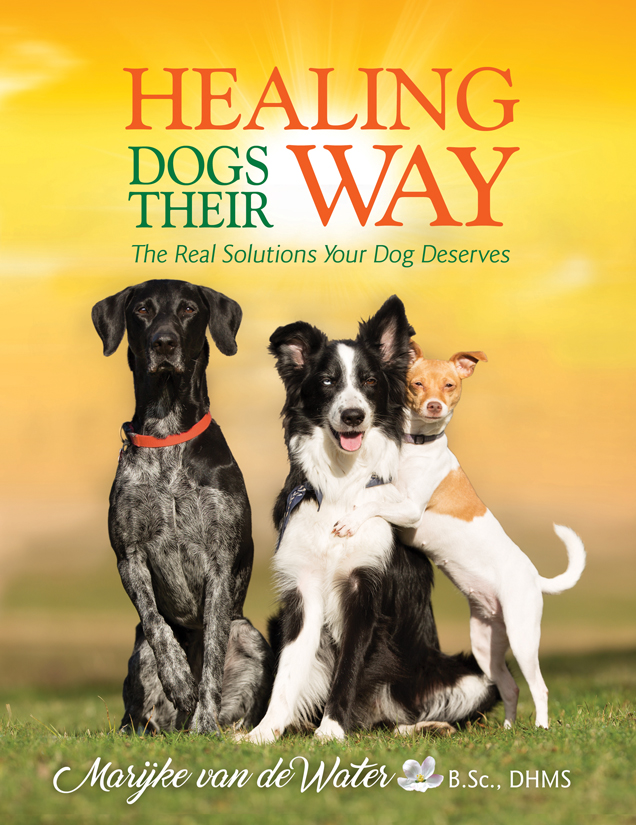The Microbiome of the Domestic Dog
~ Restoring Digestive Balance ~
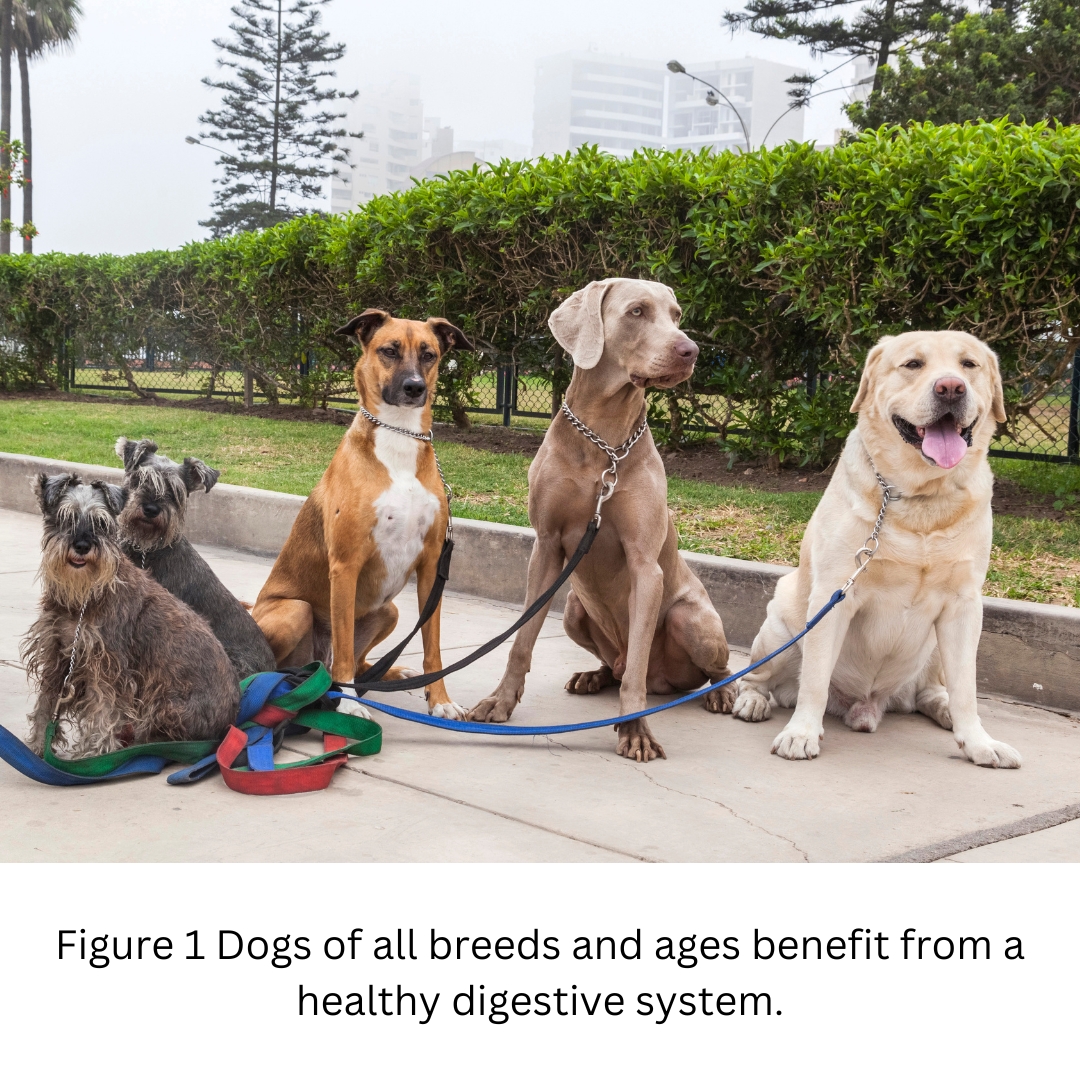 The use of probiotics (pro = good, biotic = alive) for almost all species – including animals and people - have really come on strong in the last several years. We have been waiting a lot of years for science to catch up on what many of us instinctively knew or learned from our grandmothers; that a healthy gut is associated with good health and longevity. Science is still trying to sort it all out, but we have learned more about the microbiome over the last few years than we have ever known before, including how the use of beneficial bacteria through diet and probiotic supplements can help to strengthen the health of all animals.
The use of probiotics (pro = good, biotic = alive) for almost all species – including animals and people - have really come on strong in the last several years. We have been waiting a lot of years for science to catch up on what many of us instinctively knew or learned from our grandmothers; that a healthy gut is associated with good health and longevity. Science is still trying to sort it all out, but we have learned more about the microbiome over the last few years than we have ever known before, including how the use of beneficial bacteria through diet and probiotic supplements can help to strengthen the health of all animals.
What Is a Microbiome?
The microbiome is a complex network of trillions of microbes (tiny living things) that every species on the planet relies on for good health. A balanced microbiome helps dogs digest food of all kinds and convert it into energy. It also helps to manufacture vitamins and absorb minerals. Bacteria, fungi, yeasts, protozoa, and viruses are all examples of microbes which co-exist in the microbiome including the canine digestive tract. Collectively, these are known as microbiota, while the corresponding genetic material is referred to as the microbiome. Balance and diversity is the key. The richer the microbiome is, the more biodiversity it has, and the stronger the health of the animal. The most abundant bacterial phyla in the canine gut are Firmicutes, Bacteroidetes, and Fusobacteria.
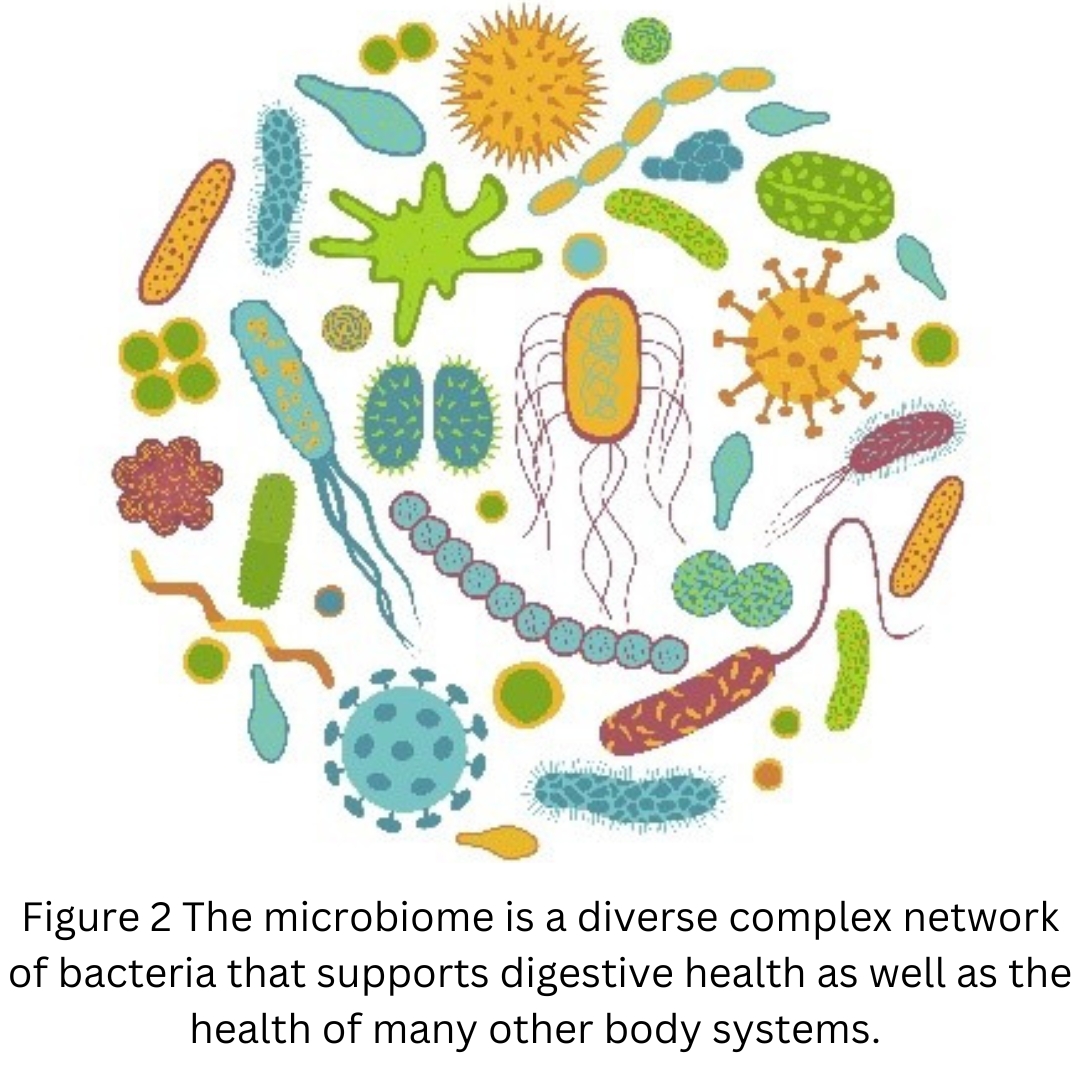 A microbiome is not just found in the intestines; it is found throughout the body where it helps to restore balance and ensure intracellular communication. In fact, every organ, including the skin, has a localized population of microbes. And each microbiome in each part of the body is distinct from the others. For example, the bacterium in the stomach is different from the cecum, or from the skin. And the bacterial population can even vary from one area of the gut to another. The gut-brain connection is also very important as microbes send signals to the brain affecting the production of neurotransmitters, and therefore emotions and behaviour.
A microbiome is not just found in the intestines; it is found throughout the body where it helps to restore balance and ensure intracellular communication. In fact, every organ, including the skin, has a localized population of microbes. And each microbiome in each part of the body is distinct from the others. For example, the bacterium in the stomach is different from the cecum, or from the skin. And the bacterial population can even vary from one area of the gut to another. The gut-brain connection is also very important as microbes send signals to the brain affecting the production of neurotransmitters, and therefore emotions and behaviour.
A healthy and diverse microbiome also has a positive influence on nutritional status supporting the production of essential fatty acids, amino acids, B-vitamins, and micronutrients.
Dysbiosis
Disturbances and imbalances in normal gut bacteria that result in disease or dysfunction is known as dysbiosis. Dysbiosis means that there is a decrease in diversity and a higher number of disease-causing pathogens.
Dysbiosis can increase the release of cytokines which are inflammatory chemicals that
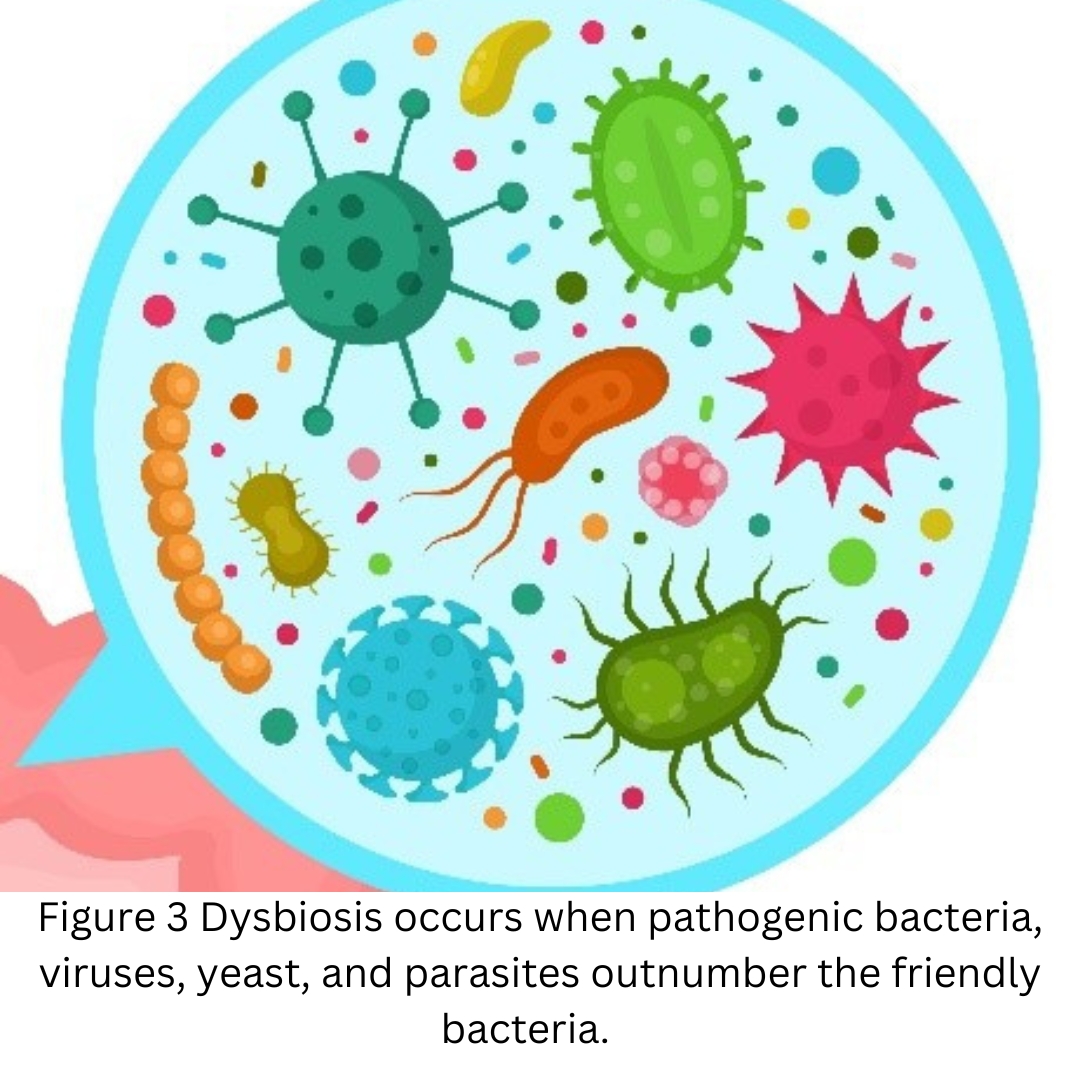 can cause mild or severe inflammation throughout the body. Inflammatory cytokines cause skin problems, immune reactions, joint pain, anxiety, and mood changes.
can cause mild or severe inflammation throughout the body. Inflammatory cytokines cause skin problems, immune reactions, joint pain, anxiety, and mood changes.
Once the microbiome is damaged the immune system is also affected. In some dogs the immune system may recover quite quickly but in those dogs with pre-existing health conditions, chronic infections, food allergies, or emotional stress the microbiome and the immune system may take a very long time to recover.
Signs that your dogs may have dysbiosis include gas, bloating, diarrhea, leaky gut, weight loss, skin problems, dental issues, inflammation, immune diseases, and behavioural issues.
How Does a Dog’s Microbiome Become Unbalanced?
Dysbiosis is usually due to an increase in acid as caused by diet, stress, and high numbers of pathogenic bacteria, viruses, yeast, and parasites. Microbes in the gastrointestinal tract are very sensitive to changes in pH and excess acid levels favour disease-causing bacteria which then upset the delicate balance.
Age, lifestyle, environment, stress, commercial food, and medications are seen as the biggest contributors to the health of the microbiome in the domestic dog, and therefore general health.
That’s why wolves who are not subjected to the same kind of stress, nor commercial food or medications have a more diverse microbiome. However, wolves are also affected by altitude, pressure, and climate indicating that the external environment plays an important role in digestive changes as well. Therefore, gut health can vary between wolf packs in different areas. And older wolves, similar to older dogs, have a less robust microbiome.
Diet
The biggest adaptation in the microbiome occurs from diet. One study showed that captive red wolves on a kibble diet had a different microbiome than captive wolves on a whole meat diet. The whole meat wolves had a healthier increase of Fusobacteria which is associated with a high protein diet. And wolves in captivity who ate a whole meat diet had a different gut composition than wolves in the wild. This is because the microbiome in the captive wolves is negatively impacted and altered by their domestic food and their unnatural lifestyles. And not surprisingly, domestic dogs on commercial food compared to a diet of meat and bones (specifically BARF – bones and raw food) showed a notable decline in bacteria abundance.
Domestic Dogs and Their Humans
Human interference is also a factor; the gut microbiota of the wolf is negatively associated with any pressure from humans. But domestic dogs are the opposite since they have adapted to human behaviour and have become bonded to us. This would explain why, given the shared lifestyles including reduced activity, the canine gastrointestinal microbiota has the highest functional overlap with the human microbiota. No wonder our dogs share so many of our health problems! Dogs are now more prone to the same diseases as their owners including diabetes, obesity, heart problems, digestive issues, and psychiatric problems.
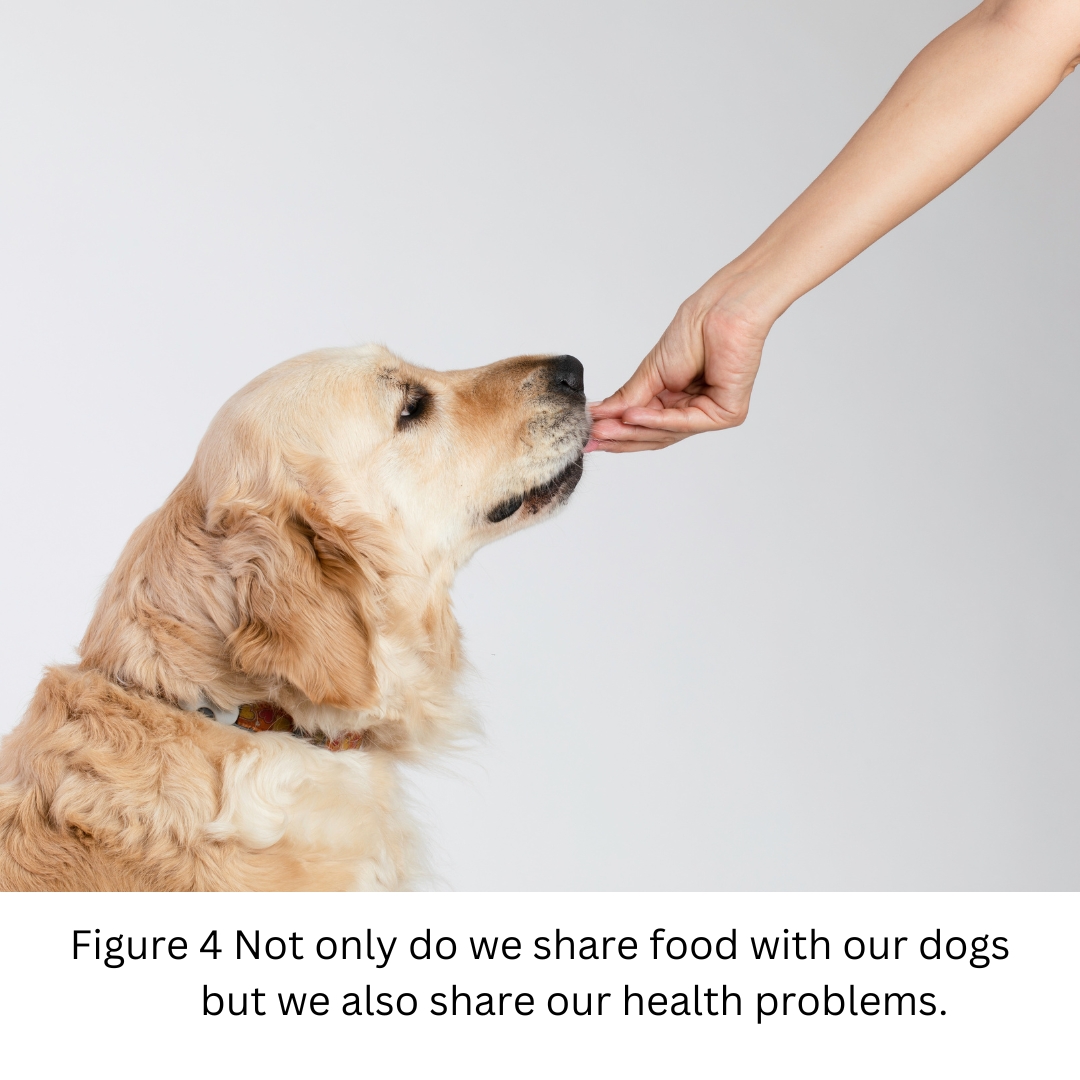
But a healthy microbiome in our dogs is also helping us! Dog owners have more diverse and abundant microbial communities than non-dog owners. One study indicated that dog-owners have less inflammation and fewer problems with a leaky gut. And it was found that there was also a reduction of Crohn’s disease. And while it was thought that pets could be spreading Clostridioides difficile (C. diff) infections to their humans, the opposite effects were found; people with pets were more likely to have protection against of C. diff infections. C. diff infections can cause diarrhea, nausea, pain, fevers, and intestinal inflammation and are mostly associated with antibiotic use.
And lucky for us - the more contact you have with letting your dogs sleep with you or lick your face and hands, the more protected you are!
Medication
Our dogs are treated with the same classes of drugs as humans: antibiotics, steroids, anesthetics, chemical dewormers, antacids, anti-inflammatories and vaccines. But they all contribute to killing off bacteria indiscriminately – friendly or unfriendly - which then promotes the growth of opportunistic pathogenic bacteria, yeast, protozoa, and viruses causing changes to the microbiome and damage to the intestinal immune system. Therefore, it is prudent to include probiotics before, during, and after the use of antibiotics, steroids, vaccines, ulcer medications, chemical dewormers, and most other drugs for that matter.
Dental Care
Digestion starts in the mouth. Dogs with periodontal disease or who can’t chew properly have more gas, heat, toxins, and acids in the gut than dogs with good dental health.
Stress
Stress has a detrimental effect on every single organ and tissue including the intestinal microbiome. Isolation, confinement, lack of exercise, loneliness, or difficult “pack” dynamics, including other dogs or the people in the house should all be avoided.
The Benefits of Giving Your Dogs Probiotics
Keeping the microbiome as healthy as possible significantly affects the immune system. Over 70% of the immune system is found in the small and large intestines. Known as GALT (gut-associated lymphoid tissue) this amazing system filters and removes mal-digested feed material, debris, waste products, toxins, and chemicals from the body. It produces antibodies and monitors all of the intestinal bacterial populations. For this reason, GALT is critical in fending off most diseases.
Given all the benefits of a healthy microbiome we can see that probiotics have a place in good health care. Benefits include improved intestinal immunity, a reduction of inflammation, and inactivation of toxins. Aside from balancing the microbiome, healthy microbes adhere to the gut wall and block pathogenic bacteria from attaching to the membranes. These actions help all digestive conditions, prevent leaky gut, and help regulate weight.
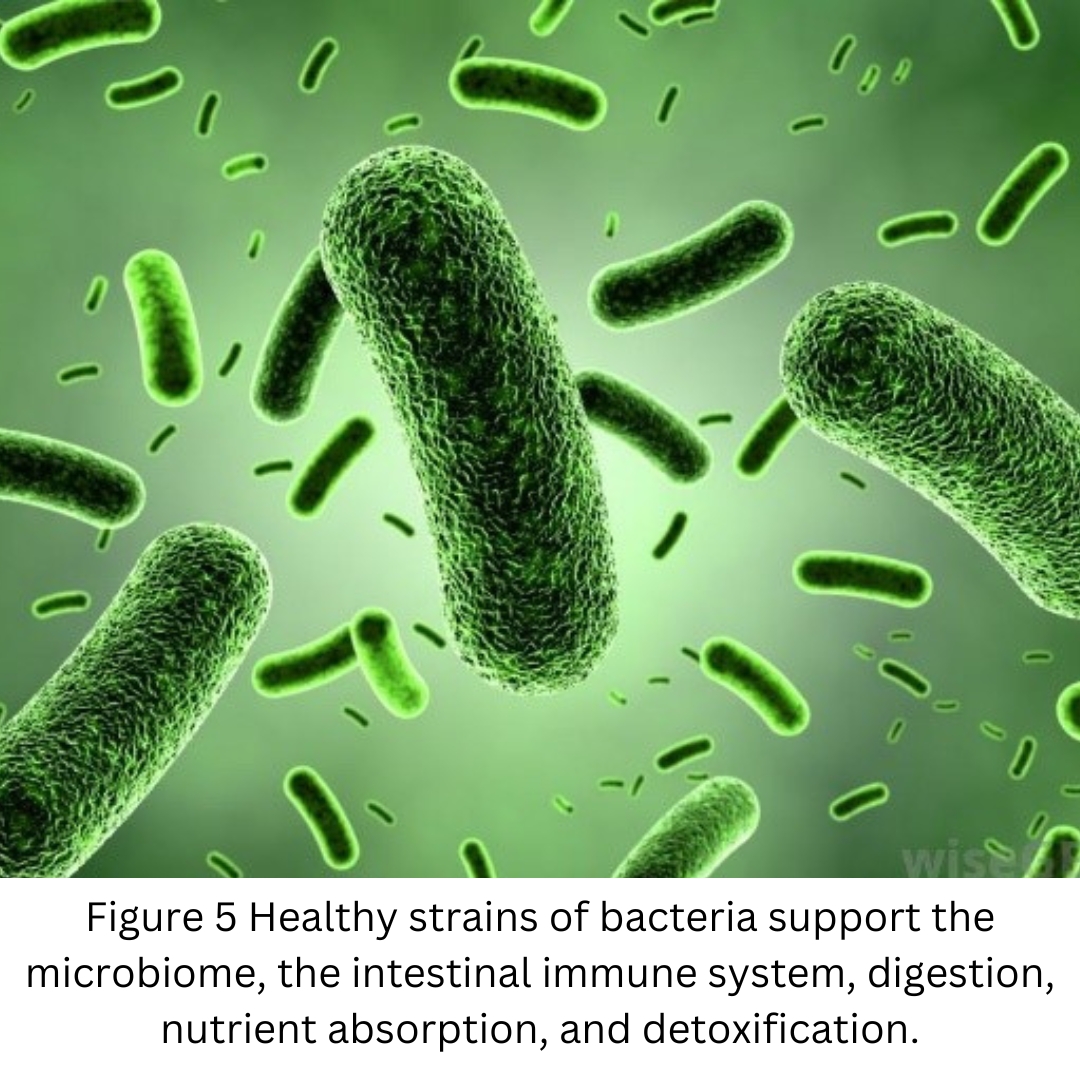
What Kind of Probiotics Should You Give Your Dogs?
To maximize potency the probiotic that you purchase should be refrigerated and require refrigeration after purchasing. Probiotics that are stabilized to room temperature have less potency and also lose that potency much quicker than “cold” probiotics. There are very few species that can survive at room temperature and most of them die within 30 days. Probiotic supplements should also be free of binders, fillers, or preservatives. Probiotics, i.e., live bacteria, are measured in colony forming units (CFU) which are living bacteria. Dosages may range from 1 billion to 10 billion CFU depending on the product. Avoid products that contain more than four or five strains of bacteria since certain strains may compete for absorption. Adverse effects of probiotic supplements are rare in both humans and animals.
Do Probiotics Need to be Species Specific?
Acidophilus, Lactobacilli, Bifidobacterium, and Enterococci are common ingredients in probiotic supplements. Many bacteria however are not necessarily indigenous to the canine intestinal tract. And despite the purported benefits of using a species-specific strain, the ability of probiotics to colonize the intestinal tract does not seem to be based on species or host specific bacteria. In fact, some bacterial species taken from the feces of horses were actually more adherent to the digestive tracts of humans and dogs than they were for the horses. Therefore, probiotics should be chosen based on their properties and their potential benefits, not necessarily their origin or their ability to colonize the intestines.
Prebiotics
Prebiotics help the microflora as well. Prebiotics provide soluble and insoluble fibre usually from plant fibre which the healthy gut bacteria can metabolize for food to increase their numbers and the diversity of the microbiome. It is therefore beneficial to feed our dogs a variety of different vegetables and some grains. Prebiotics are found in the following foods and herbs:
• Flax seeds
• Chia seeds
• Cooked barley
• Cooked oats
• Marshmallow root
• Slippery Elm
• Apples
• Leafy greens from the garden or kitchen
Toss in a dose of Riva’s Pro-Colon and your dog’s digestion will be amazing!
How To Restore the Microbiome and Maximize Your Dog’s Health
Change Up the Lifestyle
• Add cooked vegetables to their meals.
• Keep all medications to an absolute minimum and ask yourself, your dog, and your vet if your pet really needs these medications long-term.
• Reduce stress levels.
• Add digestive herbs as required; herbs are often natural prebiotics which support digestion and help to restore the balance of microbes in the intestines.
Recommended Supplements & Remedies
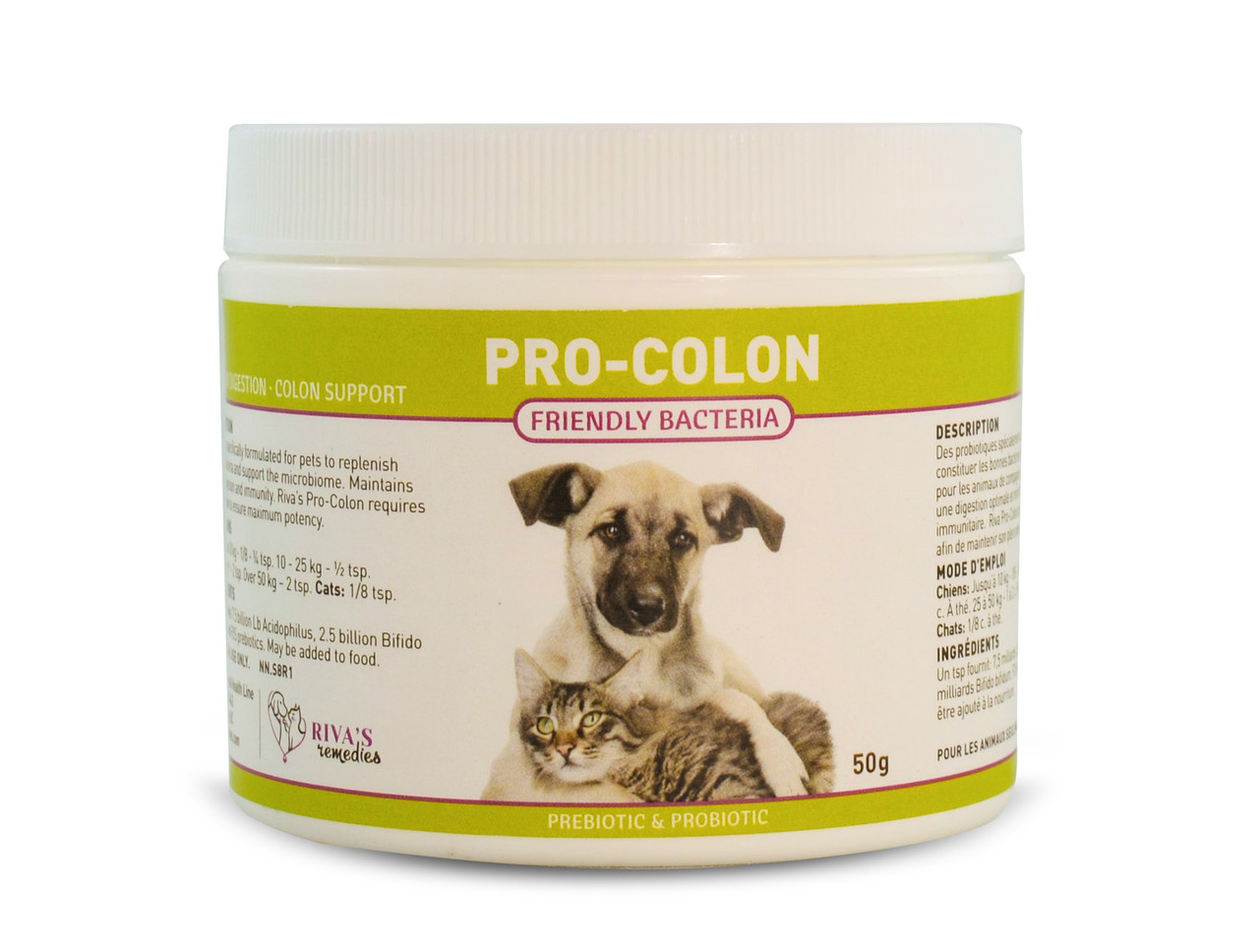 Pro-Colon: (A proprietary blend of acidophilus, bifido bifidum, and fructo-oligosaccharides (FOS). Keep refrigerated. Pre- and probiotics to maintain a healthy microbiome. Supports nutrient absorption, aids leaky gut as well as the intestinal immune system. Contains no fillers or binders.
Pro-Colon: (A proprietary blend of acidophilus, bifido bifidum, and fructo-oligosaccharides (FOS). Keep refrigerated. Pre- and probiotics to maintain a healthy microbiome. Supports nutrient absorption, aids leaky gut as well as the intestinal immune system. Contains no fillers or binders.
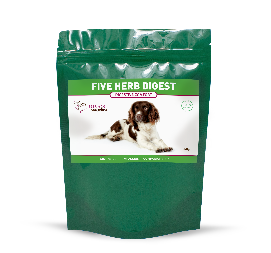 Five Herb Digest herbal blend: (A proprietary blend of caraway, catnip, fennel, fenugreek, and peppermint leaf.) Supports the function of digestive enzymes and promotes healthy overall digestion. Maintains a calm digestive system.
Five Herb Digest herbal blend: (A proprietary blend of caraway, catnip, fennel, fenugreek, and peppermint leaf.) Supports the function of digestive enzymes and promotes healthy overall digestion. Maintains a calm digestive system.
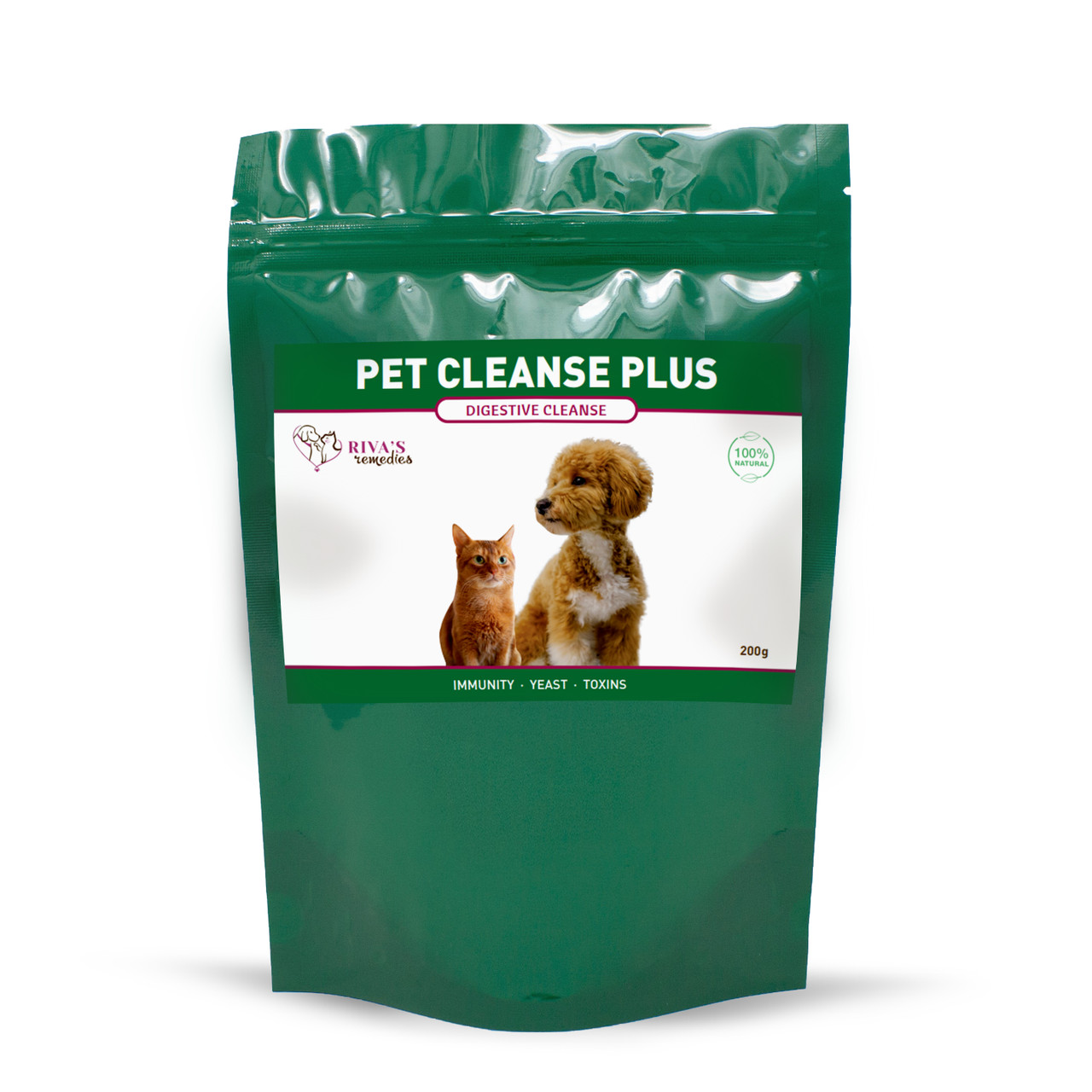 Pet Cleanse Plus herbal blend: (A proprietary blend of sage, thyme, slippery elm, cayenne pepper, and garlic.) Supports the microbiome to help maintain intestinal health and resistance in dogs with bacteria, parasites, and yeast.
Pet Cleanse Plus herbal blend: (A proprietary blend of sage, thyme, slippery elm, cayenne pepper, and garlic.) Supports the microbiome to help maintain intestinal health and resistance in dogs with bacteria, parasites, and yeast.
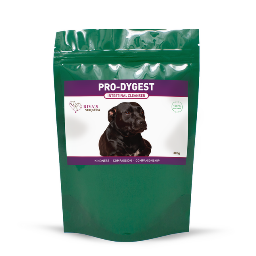 Pro-Dygest herbal blend (A proprietary blend of Bentonite clay, chamomile, Irish moss, and slippery elm.) Intestinal cleanser and detoxifier. Protects intestinal membranes from poorly digested food particles and irritations. Aids leaky gut.
Pro-Dygest herbal blend (A proprietary blend of Bentonite clay, chamomile, Irish moss, and slippery elm.) Intestinal cleanser and detoxifier. Protects intestinal membranes from poorly digested food particles and irritations. Aids leaky gut.
It seems that the microbiome is its own universe that has an important job in keeping our dogs (and us) healthy. Its contributions are nothing short of amazing. We know that internal hygiene is critical for the prevention of disease and the maintenance of good health and longevity. A naturally varied diet with a quality probiotic supplement goes a long way!
If you would like to optimize your dog's digestive and immune health by identifying inflammatory and reactive foods, order a Food Allergy Test. Diet is the single biggest contributor to a healthy microbiome and overall good health.
*Please note: We provide a thorough selection of natural products to help you choose the ones that are best suited for your dog. If you need additional assistance in making the right choice, feel free to reach out to us.
For extensive information on diet, nutrition, and meal suggestions, read a copy of Healing Dogs Their Way
Other blogs you may be interested in:
How Allergies and Food Reactions Affect Our Dogs
Should Dogs Eat Like Wolves? Exploring Canine Nutrition and Diet Preferences
